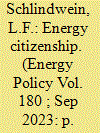|
|
|
Sort Order |
|
|
|
Items / Page
|
|
|
|
|
|
|
| Srl | Item |
| 1 |
ID:
181060


|
|
|
|
|
| Summary/Abstract |
The Energy Union and the European Green Deal advocate the participation of citizens and communities in the energy transition, which encourages a bottom-up approach in the implementation of sustainable energy initiatives. Both are in tune with the United Nations’ Sustainable Development Goals, which attempt to involve all members of society in the sustainability path. The reality in EU member states, however, is that community energy still lacks the necessary regulatory framework to compete with large utility companies. This may indicate that the governance framework is lagging behind, still not ready to include communities (collective citizens) as full participants in the energy transition.
|
|
|
|
|
|
|
|
|
|
|
|
|
|
|
|
| 2 |
ID:
191384


|
|
|
|
|
| Summary/Abstract |
According to the European Green Deal, achieving energy transition, which aims to establish a shift towards a more sustainable and low-carbon energy system, requires the active participation of citizens. Consequently, the concept of energy citizenship has emerged as a means of understanding the role of citizens in this process. This study conducts an integrative literature review with the objective of providing a comprehensive definition of energy citizenship and distinguishing between different types of energy citizens based on their engagement within the energy system. Six different types of energy citizens (i.e., consumer; prosumer and prosumager; participant in protests and movements; policymaker; business entity; and energy community), acting as either individuals or as collective entities or both, have been defined. This differentiation highlights the heterogeneity of human behaviours within energy transition. We argue that policymaking aimed at fostering energy transition should consider the behavioural dimensions of all types of energy citizens. In order to effectively support a fair, inclusive, and just energy transition, policy measures and intervention instruments need to account for various barriers, drivers as well as the socio-economic context of the diverse stakeholders participating in innovation ecosystems.
|
|
|
|
|
|
|
|
|
|
|
|
|
|
|
|
| 3 |
ID:
191287


|
|
|
|
|
| Summary/Abstract |
Energy scholars have associated energy communities with the notions of energy citizenship and energy democracy, as citizen-based democratic governance plays critical roles in their organizational models. However, these roles have recently been challenged by the growing involvement of diverse actors, including businesses and state authorities, in the governance of energy communities. Limited evidence exists of how this evolution has impacted the form and degree of citizen engagement in these organizations. This paper addresses this gap through an analysis of 164 French energy communities. We identify the following four energy citizenship configurations: full citizen ownership, shared citizen ownership, citizen crowdfunding, and civic participation. Then, we analyze their ownership structure and institutional logics. Our results indicate that models characterized by strong citizen engagement in ownership and a strong community logic dominate the French energy community landscape. Furthermore, the community logic is still prominent, even in models where citizens are less central. This suggests that the increasing involvement of other actors in energy communities has not fundamentally threatened such an organizational form as a vehicle for energy citizenship in the French context. Lastly, the paper identifies policies to encourage a variety of energy citizenship models and generalize meaningful citizen engagement.
|
|
|
|
|
|
|
|
|
|
|
|
|
|
|
|
|
|
|
|
|